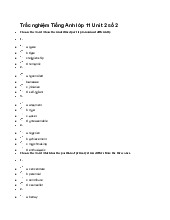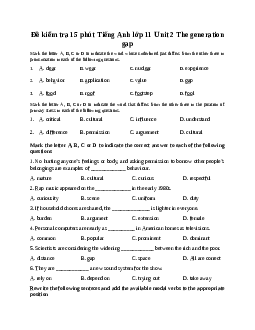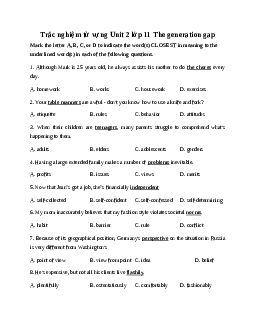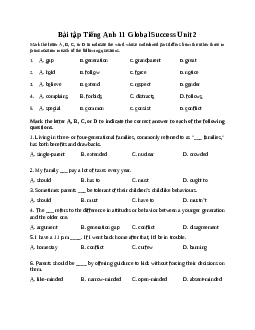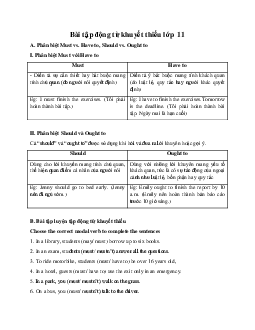



Preview text:
Giải Tiếng Anh 11 Unit 2: Language Pronunciation Bài 1
Contracted forms (Hình thức rút gọn)
Listen and repeat. Pay attention to the contracted forms in the following
sentences. What are their full forms?
(Nghe và lặp lại. Hãy chú ý đến các hình thức rút gọn trong các câu sau. Hình thức
đầy đủ của chúng là gì?)
1. Today, we'll talk about the generation gap. 2. You're right, Mark.
3. We can't avoid daily arguments. 4. That's a good point. 5. No, they don't.
6. Now let's continue our discussion with ... Gợi ý đáp án 1. we’ll -> we will 2. you’re -> you are 3. can’t -> can not 4. that’s -> that is 5. don’t -> do not 6. let -> let us Bài 2
Listen and circle what you hear: contracted or full forms. Then practise saying
these conversations in pairs.
(Nghe và khoanh vào cái bạn nghe được: hình thức rút gọn hay hình thức đầy đủ. Sau
đó luyện tập nói những đoạn hội thoại theo đôi.)
1. A: What's/What is the topic of today's discussion?
B: We'll/We will talk about the generation gap.
2. A: Don't you/Do you not live with your grandparents?
B: No, I don't/do not .
3. A: I'm not sure who'll/who will be the next presenter? Will you speak next?
B: Yes. I'll/ I will . Gợi ý đáp án 1. What's - We'll 2. Don't you - don't 3. who'll - I will Vocabulary
Vocabulary: Generational differences
(Từ vựng: Sự khác biệt thế hệ) Bài 1
Match the words to make phrases that mean the following.
(Nối các từ để tạo thành các cụm từ có nghĩa như sau.) 1. traditional
a. characteristics: special qualities that belong to a group of people or things 2. common
b. conflict: a disagreement between different generations 3. generational
c. values: beliefs about what is important in the culture of a particular society 4. cultural
d. view: a belief or an opinion that has existed for a long time without changing Gợi ý đáp án 1 - c 2 - a 3 - b 4 - d Bài 2
Complete the sentences using the correct forms of the phrases in 1.
(Hoàn thành câu sử dụng dạng đúng của những từ trong bài 1.)
1. We all have __________________, and they can influence the way we treat other people.
2. When you live with your extended family, you have to deal with __________________.
3. Each generation has its __________________ that are influenced by social and economic conditions.
4. A __________________ is that men are the breadwinners in the family. Gợi ý đáp án 1. traditional 2. generational 3. common 4. cultural view values conflict characteristics Grammar Bài 1
Circle the correct answers to complete the sentences.
(Khoanh vào đáp án đúng để hoàn thành câu.)
1. You must/mustn't respect older people. You can learn some valuable lessons from them.
2. We don't have to/have to wear uniforms on weekdays. It's the rule at our school.
3. You should/mustn't ask your parents for permission if you want to colour your hair.
4. In the past, women had to/must do all house work. It was one of their duties. Gợi ý đáp án 1. must 2. have to 3. should 4. had to Bài 2
Work in pairs. Are there any rules in your family or things that you or your
parents think are necessary? Share them with your partner. Use must, have to, and should.
(Làm việc theo cặp. Có bất kì luật lệ hoặc vật nào mà bạn hoặc gia đình bạn nghĩ là
quan trọng? Chia sẻ nó với bạn cặp của bạn. Sử dụng must, have to và should.)
Example: (Ví dụ)
A: I have to be back home by 9 p.m.
(Tôi phải về nhà trước 9 giờ tối.)
B: Really? I don't have to. But my parents think I shouldn't stay out after 10 p.m.
(Thật sao? Tôi không cần phải làm thế. Nhưng bố mẹ tôi nghĩ tôi không nên ra ngoài sau 10 giờ tối.) Gợi ý đáp án
A: I must not have a tatoo.
B: Really? I don’t have to. But my parents think I shouldn’t have tatoos.
